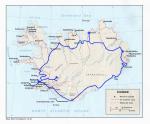 Sophisticated models and analytical tools that assist in the creation of a corporate strategy in contested markets have been around for a while. These models and tools help create what the authors of the book call “red ocean” strategies where the focus is on competing within the current market boundaries by monitoring the competition and seeking either differentiation of products and services or cost leadership.
Sophisticated models and analytical tools that assist in the creation of a corporate strategy in contested markets have been around for a while. These models and tools help create what the authors of the book call “red ocean” strategies where the focus is on competing within the current market boundaries by monitoring the competition and seeking either differentiation of products and services or cost leadership.
“Blue oceans” however are new uncontested markets where the competition is weak or none existent and therefore irrelevant. The reason that only a few companies are able to open up those uncontested markets, according to the authors, is the focus on red ocean strategies in the strategy process.
In this book the authors set forth analytical tools to help companies structure their strategy process in a way that can lead to the opening of highly profitable blue oceans.
I thought that the idea of blue oceans is rather straight forward and common sense stuff. However it is valuable to see the idea formulated into a thorough process that can be easily emulated during the strategic process within companies. I agree with the authors that companies must have capabilities in both red and blue oceans in order to reach excellence – otherwise they will never break out of the boundaries set by their perspective industries.
I found the book to be an easy read and a bit thin at times. The examples in the book were quite interesting but I often get the feeling that you can always find examples to support any theory if you search hard enough. I’m sure someone could show that Apples success is due to the fact that the employees wear jeans to work or that Microsoft is so successful just because a lot of their employees wear glasses.
But anyway, I thought it was an interesting book and would surely recommend it to anyone interesting in strategy and innovation but for the rest of you – just wait for the movie!
Previous book reviews can be found here.








